News & Events in Belarus
Report from government, preparations for election, PMC Wagner mutiny in unordinary President’s Week
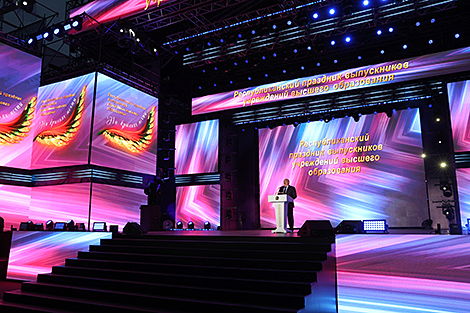
The work schedule of the Belarus president is always full of events. Aleksandr Lukashenko holds conferences and working meetings on the most topical matters concerning the country’s development, regularly visits the regions, goes on foreign trips and welcomes foreign guests, talks to reporters, signs decrees and laws. And even if there are no public events, it does not mean that the head of state does not work. It must be said that even when he relaxes, for instance, by playing ice hockey or chopping firewood, Aleksandr Lukashenko happens to find the time to give yet another instruction. All the decisions must be prompted by life, he likes to say.
The President’s Week project is intended for those, who want to keep up with the head of state, be up-to-date on the latest statements and decisions of the Belarusian leader.
Is there some potential in relations with Kazakhstan? What practices does Belarus borrow from Kazakhstan? How are preparations for the massive election campaign due in 2024 proceeding? Why is it important to stick together in the Collective Security Treaty Organization and in the post-Soviet space as a whole? How is it related to the “American shiv” in Europe? What tasks does Aleksandr Lukashenko want the government to accomplish? How has the drought affected agriculture? What did the president say in his valediction to university graduates?
An intense Saturday due to an attempt at armed mutiny in Russia. How did Aleksandr Lukashenko’s negotiations with the head of the Russian private military company Wagner Yevgeny Prigozhin help overcome the acute phase and find peaceful ways out? Watch the latest episode of BelTA’s special project President’s Week to find out.
SOMETHING TO WORK ON. What does Aleksandr Lukashenko think about relations with Kazakhstan?
The head of state started the work week by meeting with Deputy Prime Minister, Minister of Foreign Affairs of Kazakhstan Marat Nurtleu on 19 June. The official was in Belarus on a visit.
“Relations between Belarus and Kazakhstan are at a very high level, but, as athletes say, there is still room for improvement,” the president said.
According to the president, Belarus very closely watches the process of transformation of governance institutions and society in Kazakhstan and, as they say, takes note of a lot of things.
“You should know that Belarus has always been your friend and you can count on us if you need to,” the head of state stressed.
Aleksandr Lukashenko emphasized the value of reliable friends in the modern world. He remarked that many integration structures have been set up with assistance of Belarus and Kazakhstan, in particular, the Collective Security Treaty Organization and the Eurasian Economic Union. “Kazakhstan has always played an important role in the formation of these organizations, in their activities. So has Belarus,” the president said.
“Looking ahead, I see Kazakhstan, Russia and Belarus as this attractive center for other states. I have recently said that there is no reason to hope that some rich neighbor will come and help us. Unfortunately, the world is selfish, nationalistic today. You (ministers of foreign affairs) see it better than I do. Therefore, at least at the moment, we must rely on ourselves and our friends, who will always help out and support,” the Belarusian leader stressed.
Murat Nurtleu emphasized the hospitality of Belarus. “I believe that I am visiting my friends. It is a great opportunity for me to convey our message to our Belarusian brothers and friends that Kazakhstan highly appreciates our strategic partnership,” he said. “We are absolutely committed to furthering our friendly, fraternal relations.”
PEOPLE’S CHOICE. How does the president want the forthcoming election campaign in 2024 to proceed?
On 19 June Aleksandr Lukashenko also met with Chairman of the Central Election Commission (CEC) of Belarus Igor Karpenko. Preparations for the election campaign due in 2024 were discussed.
Belarus will hold its first ever single voting day in 2024. The campaign will feature elections to the parliament and municipal councils of deputies of various levels. The last Sunday in February is envisaged as a single voting day. Thus, the first single voting day will take place on 25 February 2024.
Another innovation is the formation of the Belarusian People’s Congress, which acquired a constitutional status after a referendum in Belarus. The Constitution stipulates that the Belarusian People’s Congress is supposed to convene for its first meeting within 60 days after a single voting day. Thus, the last day to start the meeting of the Belarusian People’s Congress is 25 April.
The development of a presidential decree
“The elections are round the corner. There are a lot of novelties. Especially in terms of the Belarusian People’s Congress. The matter is about the parliamentary elections and the corresponding presidential decree. I have read the materials that you have submitted. There are no remarks about any of the matters. Especially about the need to issue a decree. Today I will instruct the President Administration to take a sit down with you and work out (together with the government) the best timeframe for adopting this decree,” the head of state noted.
“I think your proposal in this regard is reasonable. A lot of people were involved in working it out. You had probably thought it through before submitting. Therefore, the matter of the decree on elections is not a problem. Consider it resolved,” Aleksandr Lukashenko said.
Interaction with government agencies
Another item that was discussed during the working meeting with the head of state was interaction with state bodies during preparations for and during the actual election campaign.
“This is a good proposal. Nothing should be discarded. We have extensive experience and practice in holding elections in terms of involving government bodies and other state institutions. Everything is at your disposal. You are responsible for organization. And all government bodies and structures, me included, will help you implement the plan that we have agreed together,” the Belarusian leader said.
“A single voting day is an innovation, too. We elect all the councils along the power vertical. Therefore, there will be plenty of work. We will carry out this work without hurrying, in a calm manner,” the president said.
Information support
“As for information support, we also have a lot of experience. But there are a lot of new things, too. We need to use the Internet and to create new content, as you suggest. We need to do it as well in order to make it convenient for people,” Aleksandr Lukashenko said.
He suggested getting down to this work, starting from inviting voters, including by sending text messages.
Honest elections and observers
The head of state touched upon the matter of inviting observers to the upcoming elections in 2024. “The entities that invite observers are determined by law. We have nothing to hide. When the time comes, when we deem it necessary, we will invite observers. So that they could see how elections proceed. So that we would not be reproached for holding elections like the United States does. Where people are shot at after elections, where voting by mail is allowed and so on. And where there are a lot of falsifications. It is evident today. We have to hold the elections in an honest way,” the president said.
Aleksandr Lukashenko stressed that Belarus has nothing to hide. “Today about 80% unequivocally support the policy that we have determined. What should we be afraid of? Well, we will fight for the 20% that are hesitating or who are against. I say this as the president," the head of state said.
The formation of the Belarusian People’s Congress
The head of state drew attention to another novelty – the formation of the Belarusian People’s Congress.
“We are laying a certain foundation in this matter. We are gaining experience. We have to approach it very attentively. A lot has been defined in the Constitution and in the laws: numbers, elections, nominations, and so on. There is no controversy here. We need to hold elections to the Belarusian People’s Congress in an open and honest manner,” the head of state said. “There will be different people there. I am convinced there will be various points of view. The only thing is that there will be no enemies there. But we don’t need enemies. Neither does our society. And the points of view have to be different so that we could make the right decision."
In conclusion Aleksandr Lukashenko said: “Having read your written report and proposals, I, for example, do not see any other approaches. We need to start this work now.”
STRENGTH THROUGH UNITY. About what did Aleksandr Lukashenko talk to the ministers of foreign affairs of the CSTO states?
On 20 June the Belarus president met with the ministers of foreign affairs of the Collective Security Treaty Organization (CSTO) member states. Call for stronger integration of the CSTO member states was the key message of Aleksandr Lukashenko’s speech. It has never been more important for the CSTO countries to stick together. By the way, Belarus now presides over this organization under the motto “Through solidarity and cooperation to peace and security”.
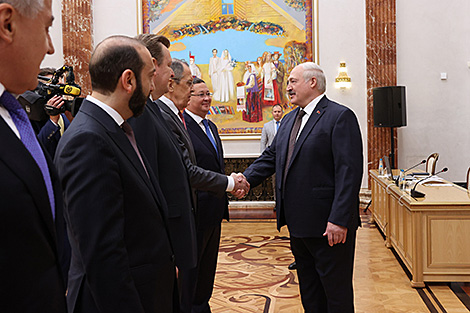
Important statements for influential people
It was the third meeting the president had held in the last few weeks with heads of government agencies of various integration associations. On 1 June Aleksandr Lukashenko met with the chiefs of the CIS special services, on 8 June – with the secretaries of security councils of the CSTO countries. Back then and now Aleksandr Lukashenko underlined the importance of preserving these interstate bodies by addressing the people, who have certain influence on the making of political decisions in their own countries.
“No one needs us, except for other countries that emerged on the post-Soviet space after the collapse of the Soviet Union. In fact, we speak the same language, we have a common economy, we have common markets, we maintain manufacturing cooperation, and so on. It took generations to achieve it. So why destroy it? Why ruin this common market?” the president asked a rhetoric question during the meeting on 1 June.
“The military-political situation around the CIS is aggravating and will continue to escalate. We need to understand that the big players are trying to pull us apart, Russia, Belarus, the Central Asian states. We, men, must not allow this. This is my firm belief. I feel it in my gut. After all, I have been working as president for some time now. We see the growing militarization of the NATO countries and the unprecedented concentration of troops near our common territory, the incitement of conflicts,” Aleksandr Lukashenko said back then.
This is why – in order to prevent discord in integration bodies – the Belarus president has repeatedly called for looking for peaceful ways to resolve conflicts. He repeated it once again for the secretaries of security councils of the CSTO countries on 8 June: “For god’s sake, don’t quarrel with each other. We will still have an opportunity to quarrel with many: you see how they are trying to pull us apart.”
In this series of events the head of state’s meeting with the ministers of foreign affairs of the CSTO countries looks like persistent continuation of Belarus’ efforts to beef up integration bodies in the post-Soviet space. What is the reason behind this persistence? The time for the Collective Security Treaty Organization is far from simple and requires maximum mobilization of strength, experience, and resources for preserving the peace.
Problems and their resolution
According to the president, the lack of solutions for specific problems is one of the shortcomings the Collective Security Treaty Organization is criticized for. For example, for a long time Kyrgyzstan has been asking for help in resolving the conflict with Tajikistan. Armenia also makes complaints. “I would say that there are problems, very serious problems. If we do not solve these problems, the CSTO countries will always reproach each other, express dissatisfaction with the work of the organization as a whole. Problems are supposed to be addressed. No matter how hard these problems are, we need to look into the problems that the CSTO member Armenia and the CSTO members Kyrgyzstan and Tajikistan are trying to solve,” the head of state said.
“There are problems, and they must be solved, no matter how difficult and complicated they may be. It is necessary to address issues, which are no longer simple problems that exist in various countries, but problems, which resolution is overdue.” If it is not done now, “friendly advisers” from the West may get involved and then things may be too late.
Reasons for sticking together
According to the head of state, certain areas of responsibility have evolved over the course of the Collective Security Treaty Organization’s existence. “Unfortunately for us and for Russia (because this is our area of responsibility), real military threats to security have emerged on the western flank of the CSTO. These threats are very serious, more serious than anywhere else. The situation in Transcaucasia and Central Asia is not calm either (and things are likely to get worse),” Aleksandr Lukashenko said.
“Full-scale hybrid wars have been unleashed against sovereign countries that do not follow instructions of the West,” the head of state said. “We lived through all this before. Sometimes we do not draw conclusions from the past and start making old mistakes in new ways.”
“The current situation in the world leaves us no doubt that we must stand together,” the head of state stressed. He is convinced that there is no reason to rush into making decisions about withdrawing from any integration associations, as Ukraine or Georgia did with their membership in the Commonwealth of Independent States (CIS). “As for Georgia, you can see a certain change in their policy: they are fed up with Western promises and want to return to our market again, because no one will let your milk, meat or wine into their markets. The markets have long been divided and there is a tough fight for them. This is the second reason why we should stand together. Our market is the second reason. If foreigners offer you something, they do it in exchange for resources (give us resources, then we will support you) or for some policy (if you follow their suit, toe the line, and support the policy they pursue),” the head of state explained.
American “shiv” in Europe
The president used obvious examples to prove that hasty decisions to withdraw from integration associations do not represent the best option for the country and its nation. “We must stick together, especially in this complicated time. Not because Russia, the core of our organization, is in a complicated situation. Russia is a part, an element of everything that is happening in the world," Aleksandr Lukashenko said.
In his words, there are problems of global importance in the African region, between China and Taiwan, between the USA and Europe. “Americans have split Europe and they need to reign it in now. Europeans claim that you [the CSTO countries], including Belarus, are losing sovereignty and so on. Nothing of the sort! You lost it a long time ago. What can I say about the fact that they gave up on cheap energy resources from Russia and are buying it three to five times the price? What is this? They were bent, stabbed with a shiv, and it’s not long until they fall down. Yet they are arrogant enough to lecture someone about sovereignty! What sovereignty? A fierce fight, a battle is going on on a global scale. It is yet unclear how it will end,” Aleksandr Lukashenko said.
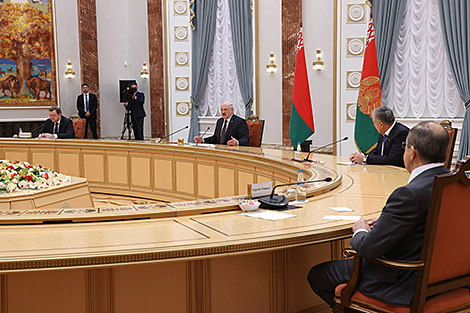
“In this large-scale confrontation, we must preserve what’s ours, at least,” the head of state stressed. The idea became particularly topical in the period of counteraction of the sanctions-fuelled pressure. Belarus and Russia teamed up and managed to not only survive but give a powerful boost to the development of their own technologies, manufacturing cooperation, and import substitution.
“Let's not lose it. We will not find anything outside our [post-Soviet] space. This is my point of view,” the head of state said.
About the common past, present, and future of the Collective Security Treaty Organization
Aleksandr Lukashenko stressed that countries of the Collective Security Treaty Organization have solid historical basis, on which their interaction is built. This basis is the common past, which includes among other things the defense of the Soviet Union during the Great Patriotic War of 1941-1945. As well as the common present and future. “We have a common present that you and I are building. This is confirmed by the successful work of integration associations in the post-Soviet space. Judging by the packed international agenda in the area of our responsibility, I am sure that we have a common future, which again depends only on us,” the Belarusian leader said.
A number of positive cooperation examples can be found in the work of integration associations in the post-Soviet space. Thus, the latest meeting of the Supreme Eurasian Economic Council in Moscow discussed matters of alignment of integration processes, the development of alternative payment systems, and the development of transport infrastructure. The decision to launch a mechanism for the joint financing of manufacturing cooperation projects within the framework of the Eurasian Economic Commission can also be cited as a positive example. According to the president, this is the most important step in strengthening economic and commercial industrial sovereignty.
“In the Commonwealth of Independent States our range of cooperation is extensive: from humanitarian matters to interregional and cross-border cooperation, interparliamentary ties,” Aleksandr Lukashenko continued. “As a guarantor of stability and security of our countries and the Eurasian region as a whole the CSTO needs to keep up with the trends."
The president considers the close ties between the CSTO countries in the political, military, economic, social and other areas to be the key to lasting peace between them and the basis of their unity in the international arena. “Today it is difficult to say what the world order will be in the future. However, it is obvious that only those who maintain cohesion will be able to go through this difficult stage with the least losses. This is why we are increasingly often talking about the need for greater integration within our organization,” the Belarusian leader stressed.
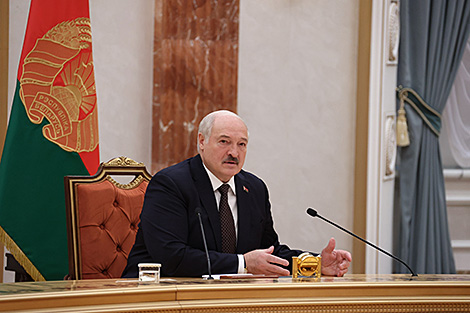
A plan of action in economy
In order to step up integration, the president suggested working out a common Collective Security Treaty Organization action plan. “We need to understand that they will continue putting pressure on us. Even if the conflict in Ukraine ends, they will not leave us alone. We need to develop a joint plan of actions, primarily in economy. This plan should unite us all,” the Belarusian leader said.
One of the main goals of this plan is to secure independence from imports. “We will consider ourselves isolated, like the Soviet Union was once. But we must survive, we must determine what we can produce at home (we can make almost everything ourselves, about 90%), and we will somehow buy the remaining 10% until we get away from dependence on imports,” the head of state said.
In his words, Belarus and Russia have already come close to developing such a plan and intend to implement it. “I think the Russian president and I are close to making this plan. Of course, we will not have 90% self-sufficiency, but it will surely be 80%. We have no other way. We have no time to sit and wait for someone to come, create something, and then leave,” the head of state said.
What is Belarus ready to do for the sake of stronger CSTO?
“Solidarity, unity and cooperation underlie the concept of our presidency in the CSTO,” the head of state said. He expressed gratitude to the organization’s member states for supporting the priorities of the Belarusian presidency in the CSTO, which, as the president is sure, meet common interests.
“We proceed from the assumption that today the most important area of work is to secure the settlement of crises within the CSTO zone. If assistance is needed from Belarus, and in this case our initiatives, they will be suggested. We will do everything possible to restore and strengthen trust between our partners,” Aleksandr Lukashenko stressed. “The CSTO is not an aggressive or offensive military and political bloc. It is an organization of an exclusively defensive nature with a constructive and unifying agenda.”
The West’s aggressive rhetoric and voices of reason
As for the Collective Security Treaty Organization’s interaction with other organizations (for instance, the United Nations Organization and the Shanghai Cooperation Organization), the president believes it is necessary to step up these efforts to speak up on behalf of the CSTO at international platforms so that this voice could be heard at last. “Certainly, they don’t want to hear us intentionally. We are like a thorn in the side of either NATO, or the European Union, or the United States along with them. Nevertheless, our voice as a military-political bloc should be heard,” Aleksandr Lukashenko said.
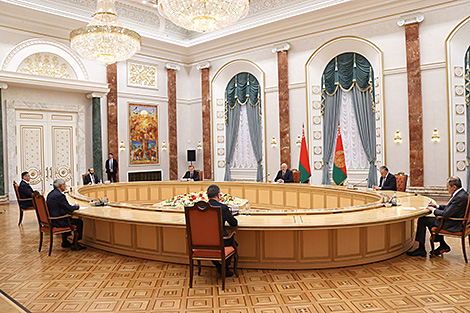
The head of state also urged to build up the information and analytical capabilities of the Collective Security Treaty Organization. “Today we are all in the war zone of information and psychological operations. We feel it particularly well. Russia has recently experienced it, too. You all have probably such experiences. We will not be able to shield ourselves from this. We need to step up our efforts in the information and analytical field and in cooperation with mass media,” Aleksandr Lukashenko stressed.
“Today the aggressive hysteria, primarily in the West, is drowning out the voices of wisdom and reason. They do not want to hear Belarus’ initiatives to restore trust and strengthen regional and international security,” the Belarusian leader said.
“We cannot rely solely on the idea that common sense will prevail. We should keep our guard up and direct all efforts into the strengthening and further progressive development of our organization,” the president emphasized. ”I am absolutely convinced that the collective diplomatic voice of the CSTO will make a significant contribution to the restoration of peace and security in the region.”
Aleksandr Lukashenko expressed confidence that these and other topical matters will be reflected in the agenda of the CSTO summit which will be held in Minsk in November 2023.
LIVING MEMORY. How did the president address fellow Belarusians on a war start anniversary?
On 22 June Aleksandr Lukashenko addressed fellow Belarusians on the occasion of the National Remembrance Day of the Victims of the Great Patriotic War and the Genocide of the Belarusian People.
“Today the whole of Belarus recalls the tragic events of 22 June 1941. Early in the morning, the war treacherously invaded our home, mercilessly destroying lives, families, cities and villages. For more than three years the atrocities of the Nazis brought enormous suffering to the Belarusian land. Every third resident of the country died in the devastating flame of the war,” the address reads.
Aleksandr Lukashenko emphasized that inhuman cruelty did not break the will of our people: “The entire civilian population of the republic rose up to defend our native land and fight back fascism. Our grandparents and great-grandparents were subjected to torture and terror, but retained their honor and dignity.”
“After decades of a good life, the world fabric of peace is about to break. Another wrong step of cynical Western politicians may be the last for the majority of humankind. Knowing firsthand about the horrors of war and the cost of victory, the Belarusian people preserve the historical truth, strengthen state sovereignty and the unity of the nation in the name of peace in their native land,” the head of state said.
EXPANDED FORMAT. What does Aleksandr Lukashenko demand of the government and what instructions did he give?
On 22 June the Belarus president hosted a conference with senior members of the Council of Ministers. The head of state periodically meets with top government officials to discuss economic performance. This time the conference followed an expanded format in order to also discuss other matters ranging from raising investments and the situation in agriculture and ending with road construction and social sphere.
The first economic performance results
Opening the conference, Aleksandr Lukashenko remarked that the gross domestic product growth rate totaled 100.9% in January-March 2023. “Fixed-capital investments are going back to the growth track. They rose by 2.5% over last year. However, so far it is weak progress towards hitting the assigned performance targets, even the semiannual ones,” Aleksandr Lukashenko said.
The president asked the prime minister whether all performance indicators showed growth dynamics, whether the government managed to fully overcome last year’s challenges related to logistics and transaction costs, the search for new partners and markets. He also asked how performance targets were being met.
“I expect the first deputy prime minister to provide a substantive analysis and explain where the government sees reserves to boost investments by the end of the year all the way to 120% as well as analysis of the progress to implement the ‘one district - one project’ concept,” the head of state added.
Speaking about the situation in the manufacturing sector, Aleksandr Lukashenko praised good results, adding that the stockpiles are still exceeding 76%. “There are no qualitative changes in wood processing. The work on spending the Russian loan on integration projects is going very slowly. Tell me about the measures taken to remedy the situation,” the head of state said.
Investments and the relevant draft legislation
A bill on facilitating and stimulating the realization of investment projects was submitted for consideration of the head of state. According to the developers, the bill will help fix the situation and increase the volume of investments. During the conference the president noted that the document should be studied attentively before getting forwarded to the parliament.
Aleksandr Lukashenko remarked: “Essentially, the document will replace Ordinance No.10, which represented a breakthrough back in the day and served as the legal foundation for this sphere for nearly 15 years. Representatives of 20 countries have invested over $8 billion over the years. More than 1,000 projects have been successfully implemented.”
But for the past few years the volume of domestic and foreign investments has been declining, which is having an adverse effect on economic performance, Aleksandr Lukashenko pointed out.
“Naturally, today any country is trying to offer attractive conditions to investors. We should also create competitive advantages, so that money would be invested in promising, high-tech, innovative industries right here in Belarus,” the president said. “I am not against reasonable innovations, and I am always ready to support them. I would like however to hear your report on the essence of the draft law and its expected effect. Who is the bill aimed at?”
Aleksandr Lukashenko said: “In the current geopolitical circumstances it is difficult to expect the arrival of Western investors in the Belarusian economy. Let’s focus on other ones: eastern, Asian, African investors and so on. Well, we should also welcome Western investors instead of rejecting their offers right away.”
The president reminded about an important rule: social responsibility should be the foundation of any project. It should be manifested in the form of meaningful employment, decent salaries, an extensive social package, and naturally the payment of taxes.
“Instead of coming here as they said in the past and squeezing everything out of the people, squeezing everything they can and paying peanuts to workers, let’s say, $500 while not paying taxes at all. While taking most of the profits in the form of dividends to unfriendly countries. I don’t think we need such projects,” Aleksandr Lukashenko stressed. “They should not approach Belarus like a banana republic. They should treat Belarus like a normal, high-tech and highly developed country. And we should primarily work with our own investors.”
The situation in agriculture and adverse weather conditions
Describing the situation in agriculture, the president noted the lack of rain and the resulting dry soil in certain areas. “Crops have certainly become dry here, at [Minsk Oblast Governor Aleksandr] Turchin’s, who has sinned before God, and around me (I don't know what my sins are), where I live, on higher grounds,” Aleksandr Lukashenko remarked.
However, this is not the reason to lament and crow over the harvest prospects, the president is convinced. “I understand what’s going on. Indeed, crops have become dry in certain areas. First of all, cereals and grasses have suffered a bit,” he said.
Bearing it in mind, the head of state gave timely instructions to the government to also re-plant grassy fodder, the harvest of which causes the greatest concern, unlike cereals. “If we do not receive a certain amount, some 200,000-300,000 tonnes of grain, our neighbor has a surplus today. We will always be able to buy cereals. Moreover, today grain sells at very low prices, sometimes even below our prime cost. It even makes sense to buy,” Aleksandr Lukashenko said.
“So there is no catastrophe and the deputy prime minister in charge of agriculture admits it. We just need to act quickly to harvest crops in the areas that have dried up,” the head of state said and highlighted the importance of strict technology discipline which allows saving crops and getting a harvest even in complicated weather conditions.
Roads in need of repairs
Aleksandr Lukashenko said: “There is another sensitive issue. Our citizens are quite concerned about the quality of roads. What can I say? Everyone drives a car. Some families have two or three cars. Yes, Belarus secured a high state of road surface back in the day and became an example for many in the post-Soviet space. But once we relaxed oversight only slightly, the situation started deteriorating.”
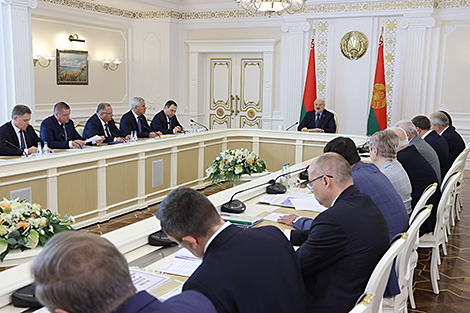
During a working trip to Grodno Oblast in April 2023 Aleksandr Lukashenko once again drew attention to the high number of people’s complaints about the state of roads. “The relevant deputy prime minister was instructed to put all the roads into shape and repair them in 2023. It is a matter of utmost importance. How are these things going?” the president wondered during the conference.
Government regulation in civil engineering
The head of state reminded those present at the meeting that back in January 2023 the government was instructed to simplify the construction process in the same way it had been done for single-family house construction.
“I was informed that most of the problems in the individual housing construction, such as access to communication lines, documentation and so on, have been solved and the people are happy. It is good if it is true. But I have my doubts. We will check it soon. I wouldn’t like to talk about it the way we did about healthcare,” the president said.
“In order to start building an apartment building, a factory, an industrial facility, it is necessary to collect a dozen or two of technical documents from electrical companies, the Emergencies Ministry, sanitary services, local authorities and the rest. The same number of documents has to be obtained at the end of the construction. We need to take a careful look at everything and see if we can shorten the list of necessary documents,” the head of state said.
Aleksandr Lukashenko instructed the deputy prime minister in charge of civil engineering and the architecture and construction minister to work on the matter: “Take a look at the list and narrow it down.”
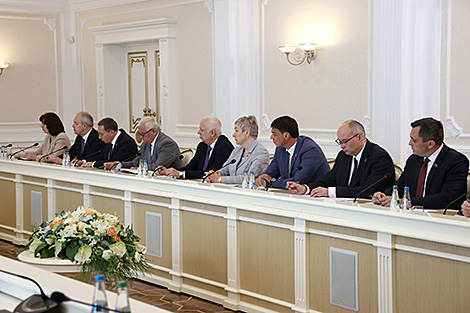
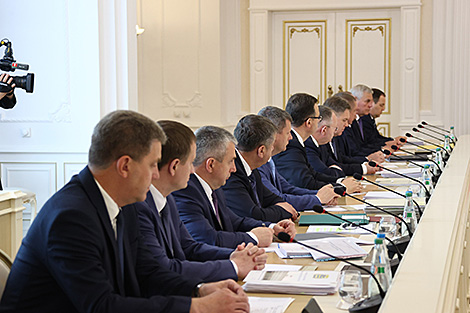
Continuing the topic of the apartment building construction, the president wondered why the problem of overdue construction projects could not be solved once and for all. “There are currently 20 apartment buildings with such a disgraceful status. 17 of them are in Minsk, Natalya Ivanovna [Kochanova, Chairperson of the Council of the Republic and the president’s authorized representative in Minsk]! Does the government have any elaborate solutions here?” the president wondered.
Instructions concerning education
During the government conference Aleksandr Lukashenko noted that social matters dominated the news agenda in Belarus for the past few weeks. “Results of the centralized exams seem to have been sorted out. The university admission process is underway. We have agreed to analyze its results and finally dot the i’s in the autumn,” Aleksandr Lukashenko said.
“We should not keep raising this topic all the time,” the head of state believes. “You can’t endlessly distress university professors and school teachers as well as parents.”
The president emphasized that final proposals should be submitted in the autumn. These proposals should include creation of new, smart and well-written textbooks, university education, final exams, basic schools, secondary schools and university admission. “All questions must be answered,” Aleksandr Lukashenko said.
The situation in healthcare and rental housing for medics
Aleksandr Lukashenko recalled a recent conference held to discuss healthcare problems. “Clear and specific tasks were set. There should be no mismanagement and incompetence in the sphere on which the nation’s health depends,” the president demanded.
“At the same time, I have warned you, the minister and the government know this, that the commission is working. Truth be told, it was swamped with complaints, as if it were a new ministry department, or a new ministry. I want to address people and ask them not to burden the commission that consists of 12-13 people with problems that should be dealt with by other authorities – municipal authorities, the central government, the ministry. Of course, they respond to all complaints, but they cannot substitute everyone,” Aleksandr Lukashenko said.
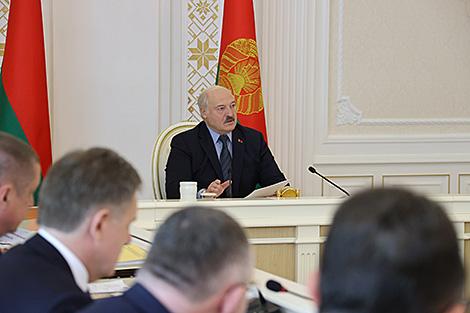
He also touched upon healthcare provision in the regions: “All the governors rushed to show a nice facade. They repaired first-aid posts, district hospitals, allocated money, and a major refurbishment effort began. It needs to be done. I do not mind it, but we must understand that first-aid posts and district hospitals should operate. And people should be happy.”
The head of state continued: “Today we will discuss the instruction to allow healthcare workers to buy out rental housing.” He recalled that initially the idea to provide rental housing was designed to address a number of specific problems, now there is a proposal to turn some of this housing into ordinary housing, and a corresponding presidential decree has been drafted.
This is why Aleksandr Lukashenko asked a question: “What was the rationale behind this rental housing? People built and bought homes, so let them keep building and buying homes. But if we build rental housing, why would we sell it? I am just raising a question, let’s discuss it.”
At the same time, the head of state expressed gratitude to healthcare workers: “Of course, most of them are amazing, they treat us, they deserve attention.”
Yet, the head of state believes that consideration of this issue should be postponed for the time being, and explained the reasons for this. “This proposal came after a huge number of problems were revealed in healthcare. Therefore, the time is not right. I think that we should return to this issue later,” the head of state believes. At the same time, he noted that workers from other sectors who live in rental housing might also want to have an opportunity to buy out such housing. Details of buying out rental housing will be considered when the ministers and the government say that all the shortcomings have been eliminated.
The president pointed out that other categories of workers also live in rental housing and could ask the same questions.
Child benefits and negligent parents
During the conference Aleksandr Lukashenko touched upon the use of child benefits. The president remarked that the state spends considerable sums on them but some parents simply waste the money on alcohol.
The head of state noted: “We spend considerable sums in order to support kids. At present children in nearly 10,000 families have been recognized as exposed to social risks. 10,000 families cannot properly take care of their kids. Negligent parents simply waste child benefits on alcohol while children suffer.”
Aleksandr Lukashenko said it is necessary to make sure that child benefits are spent on needs of the children instead of alcohol for their parents. All the appropriate measures must be taken to accomplish this goal. This is why the head of state stressed: “The system must be properly tuned: children must never be deprived while irresponsible parents need to be brought to their senses.”
The organization of 2nd CIS Games and commitment to results
Aleksandr Lukashenko gave instructions to ensure the excellent organization of the 2nd CIS Games. The competitions will take place in 11 Belarusian cities and towns on 4-14 August. “In the current circumstances this sport festival is acquiring special importance for Belarusian athletes and a wide range of our friends, who have confirmed their participation in the games,” the head of state said.
He urged: “We must not just host the Games at the highest level. We must once again show that Belarus is an open and peaceful country that offers comfortable and safe conditions for people.”
“The main thing is the result we are going to show. We have no moral right to perform poorly at the Games,” Aleksandr Lukashenko added.
The situation on markets and new manufacturing projects
Prime Minister of Belarus Roman Golovchenko described the situation in economy. In his words, in January-May 2023 the economy reached the targeted growth trajectory. Foreign trade surplus amounted to $203 million in January-April. The figure is expected to be higher once H1 2023 statistics is available.
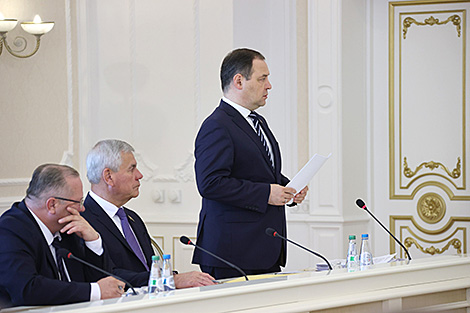
An increase in added value in the manufacturing sector accounted for the largest contribution to the GDP growth.
Aleksandr Lukashenko wondered about the stock in storage at Belarusian enterprises. According to the president, he is concerned by the current situation and wants to find out how serious the issue is.
Roman Golovchenko noted that there is a problem with selling certain kinds of dairy products. The stock in storage is worth nearly $400 million. In his words, the situation has been brought about primarily by prices on foreign markets as well as an increase in productivity on the key market – Russia.
Roman Golovchenko went on saying: “But specialists say that it is no tragedy, it is a temporary phenomenon: prices on the Chinese market and the overall Asian market have started rising. On the whole, we are working on changing our strategy for the development of the dairy industry and the milk-processing industry.”
The head of state stressed that it is a good idea not to cling onto one or two markets, it is necessary to explore markets of other countries. The president also believes that in addition to exporting milk powder it is necessary to build small factories in other countries for processing milk powder and making other kinds of dairy products. “We should go onto other markets. We cannot sit on one or two markets these days,” he stressed.
According to the prime minister, there is also large stock in storage at some industrial enterprises. In particular, the decrease in demand for Belarusian refrigerators and freezers turned out to be a serious problem for the Belarusian white goods manufacturer Atlant. The decrease has been caused by the overall low level of sales of long-lived goods in Russia and by the mass arrival of new manufacturers on the Russian market, primarily from China. For now Atlant has decided to reduce the production of refrigerators and focus on making washing machines, the demand for which is high right now.
Roman Golovchenko said: “We have probably missed the timing a bit because the space vacated by unfriendly countries is gradually being filled with Russian and Chinese manufacturers. Together with the ambassador to Russia we have analyzed the facilities that are still left in Russia. Still abandoned facilities if one can say so. Now we have to choose and aggressively exploit these areas in order to set up manufacturing enterprises, forming a center of profits over there, and delivering sets of equipment from Belarus over there.”
Aleksandr Lukashenko said: “It is a strategy. We’ve discussed it. There is nothing new about it. Not only in Russia. You have to create our own facilities, our own manufacturing enterprises where it is profitable for us and act.”
Summing up results of the conference, Aleksandr Lukashenko noted that the economy is working quite well, but there are issues that need to be addressed as soon as possible because they can have a serious effect on the situation in the future otherwise. The head of state noted that it is necessary to see and resolve them in time. Aleksandr Lukashenko reminded about his instruction: no talks about sanctions, sanctions cannot be used as an excuse. The president also believes that it is necessary to look for more potential among oblast governors.
“I am far from saying that everything has been failed. But there are issues and problems that need to be addressed,” Aleksandr Lukashenko concluded.
REASON FOR PRIDE. How did Aleksandr Lukashenko award university graduates?
On 23 June the head of state bestowed letters of commendation upon graduates and professors of higher education institutions in a solemn ceremony at the Palace of Independence.
“Today is a significant day for you, for the country, and for me as the president. Your achievements bring joy and inspire,” the president said as he opened the ceremony. Congratulating the graduates, the head of state said that they were opening a new chapter in adult life with dignity. Professors heard words of gratitude for their great work and skills.
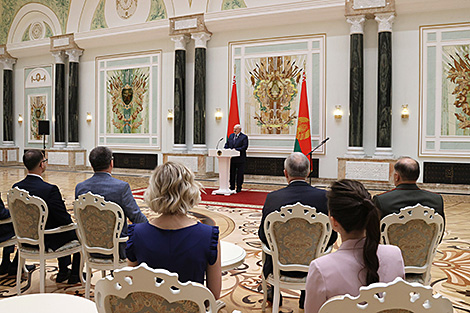
“There is a certain symbolism in this ceremony. You are taking only the first step into the profession, and you are already sharing moments of fame on an equal footing with high-level professionals. This means that you are ahead of your time. It is good and I wish you to follow this path. This is a great trust in you and I am sure you will meet all the expectations,” the head of state said.
Each of those receiving the awards has become the best at studies, scientific and social activities, sports, and creativity. Relatives, school teachers, university professors can rightly be proud of them. According to the president, graduates went through one of the most difficult stages in their lives to complete their studies. “You did great. For your success, I first of all would like to thank those who gave you your life, those who raised, educated, and taught you, those who became an authority and worthy example for you – those are parents, teachers and devoted friends,” the head of state added. “Together with them, with their support, you are confidently moving towards your dreams and achieving your goals. Your future colleagues will soon become the same support for you - specialists with extensive experience, from whom you will continue to learn.” He wished the graduates to treat their children in the same way and bring them to the same level the graduates had achieved themselves.
“It is not easy to learn, and even to relearn, because the life will make you do so as well. Do not be disappointed if you see in your new life something absolutely new and different from what you saw during the years of study. This is normal, it has always been like this. Yet your education will remain the foundation, the basis for your future life,” the Belarusian leader added.
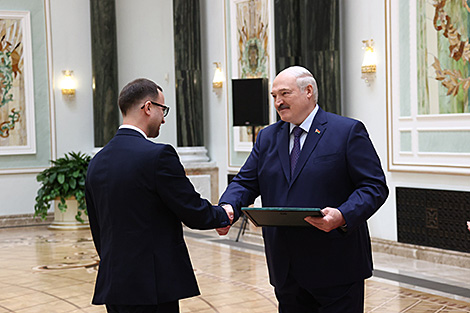
Aleksandr Lukashenko said that the graduates were completing their studies and beginning their career in the Year of Peace and Creation. The head of state wished them to have the same future - peaceful and creative.
“Looking at you, determined, ambitious and beautiful young people, I am confident that our native Belarus will become even better and more beautiful. I believe that you will do everything for this,” the head of state stressed. “You are the most important thing in our life, in the life of the older generation. We are always there and will do everything to make you feel our shoulder and care as you gradually achieve what you have planned. It is your time to make the history of our country - your country. May everything work out for you!”
Addressing the professors, the head of state emphasized: “Without you, who are in this hall, and those who will hear us today, without all your colleagues, including school teachers, there would not have been this award ceremony, there would not have been this sense of confidence in tomorrow. I have always said and will repeat this again: you are the pillar of our state. May God give you strength, inspiration and, most importantly, health.”
Aleksandr Lukashenko presented letters of commendation to five professors and 14 graduates of the country’s higher education institutions.
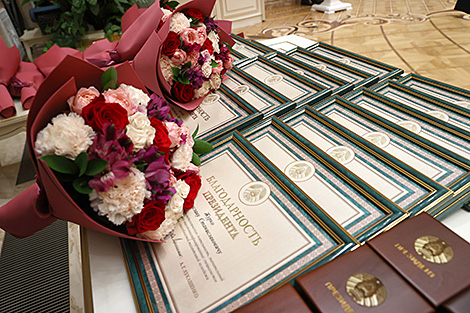
The president noted that the graduates have a long life ahead and this life might take some uneasy twists and turns. He said: “I want you to never regret what happened in your life, but always draw conclusions from your experience. I always tell graduates: if you want to be successful, you need to do everything in time and in this case you will not have to redo anything. At your age you can do anything. It will be more complicated to do it later on. Your whole life is ahead of you, everything is in your hands, hold on to the country well. I wish you happiness, success and good mood.”
A NEW FORMAT. What surprise lied in store for young Belarusians in Minsk’s downtown?
In the evening on 23 June Aleksandr Lukashenko took part in a national gala for graduates of higher education institutions outside the Sports Palace in Minsk.
Aleksandr Lukashenko told the graduates: “Dear friends! Good evening! Allow me to greet you and congratulate you on a great celebration in your life as I meet with new people in a new format in the center of our capital city for the first time. It is a unique celebration that will never be repeated. On my way here I thought there would be exceptional atmosphere here. And you create this atmosphere with your youth and beauty. How can it be any other way? Your euphoria today is easy to understand. Intensive years of studying, all kinds of exams, and sleepless nights are behind you. I mean sleepless nights you’ve spent studying. Tomorrow you will start a new life. This is why rejoice today and go towards new accomplishments tomorrow. You will teach and educate, cure, build, develop technologies, create works of art and many other things. You will safeguard peace and ensure national security.”
The president went on saying: “It is also a serious moment because a piece of our Motherland will be in your hands, in the hands of every young graduate, every young person as from tomorrow. And together we will hold our country, our Motherlands in our hands. As I’ve already told awardees this morning: look, it is your responsibility already. Don’t throw away your land. You will not be given another one. Wherever you may be, wherever you may study later on, wherever you may work. It is yours. Don’t give away yours to anyone.”
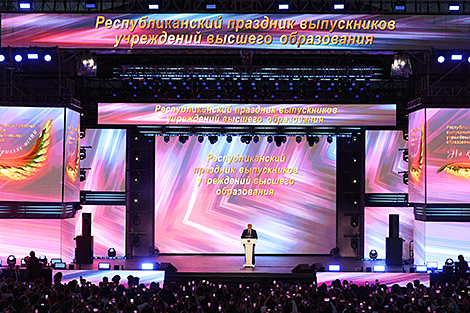
The head of state noted that the graduates will soon leave the city and travel to various parts of Belarus in order to take their first jobs. And the smaller the part of the country will be, the more noticeable the young professionals will be, the larger their contribution to the history of the native country will be, Aleksandr Lukashenko stated. “Of our cozy, beautiful and clean Belarus that we all love without a doubt,” he stressed.
Aleksandr Lukashenko said: “I said what hopes we – the president, your parents and pedagogues – put on you when I awarded outstanding graduates this morning. I said it to all of you, to the tens of thousands of Belarusian graduates. Do everything on time. Do the things you have to do today. You will not be able to do them tomorrow because you will have new problems, new cares to deal with in your life. Your turbulent, frantic, sometimes crazy life. And we live it together with you while failing to understand what is going on at times. This is why it is necessary to do everything on time. Remember it. It is the key thing. Now I simply take sincere joy in the opportunity to gift our youngsters this celebration in Minsk and other parts of the country.”
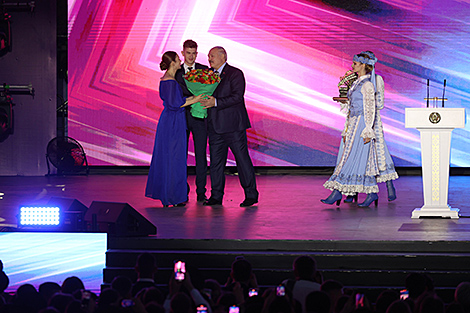
The president remarked that the country’s top graduation celebration had adopted a new format. The head of state asked the graduates not to judge things harshly if the first attempt was not perfect. He was convinced that the gala would become better in the following years. “You will no longer be graduates then but I would like to invite you both next year and later on to come here and celebrate with us together with your graduating kids. To get the impressions that you will remember for your entire lives. To find new friends or maybe your soul mates. Although you may have already come here with your fate hand in hand. You’ve done great. Your entire life is ahead of you. Always follow your desire for success. Be persistent in reaching your goals. And may these goals be high and noble,” Aleksandr Lukashenko wished to the graduates.
“I repeat once again: under any circumstances you should take good care of your own, never give it away, multiply it. You are smart, you can see what is going on in the world. However complicated and difficult it can be, take good care of it. If you lose it, you will not find it again and will not find a substitute. You will not recover it,” Aleksandr Lukashenko said.
After the president’s speech a number of graduates went to the stage. On behalf of the guests of the gala and all the graduates of Belarus they presented a commemorative gift to Aleksandr Lukashenko. It symbolizes the consolidation of the Belarusian people, preservation and enhancement of ideas of peace in Belarus, creative labor as key conditions of national development. Then Aleksandr Lukashenko and the graduates went to an observation site on the bank of the Svisloch River in order to watch a water and fire show.
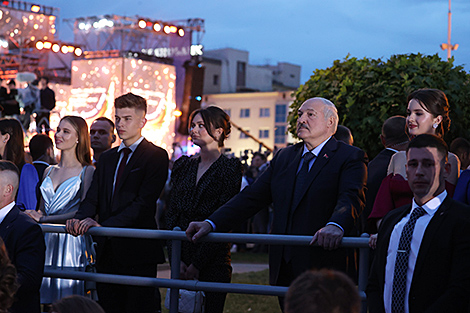
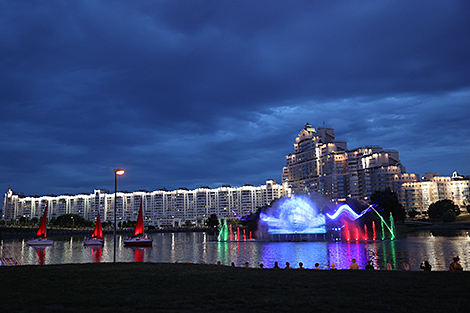
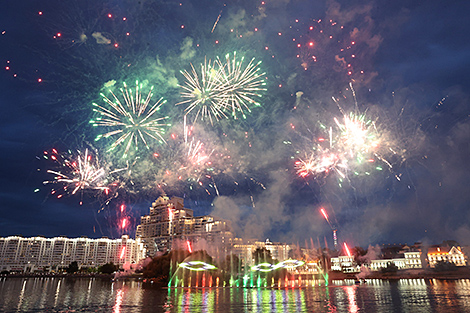
The show ended with magnificent fireworks.
MUTINOUS DAY. How did Aleksandr Lukashenko help resolve the situation with the Russian private military company Wagner?
On 24 June the Belarus president successfully helped resolve the most acute phase of the situation in Russia after Yevgeny Prigozhin, head of the Russian private military company Wagner, attempted to stage a mutiny. The Belarusian head of state had an intense Saturday, which included conferences with officers of defense, security, and law enforcement agencies, contacts with President of Russia Vladimir Putin, and negotiations with Yevgeny Prigozhin. The negotiations lasted for an entire day and ways to defuse the situation were finally found.
President of Russia Vladimir Putin talked to the Belarus president over the phone in the morning on 24 June. During the phone call Vladimir Putin informed Aleksandr Lukashenko about the situation in Russia’s south that had been caused by the private military company Wagner. The heads of state agreed on joint actions.
In response to events in Russia Aleksandr Lukashenko held two conferences with top officers of defense, security, and law enforcement agencies. The conferences took place in the morning and in the afternoon.
Acting upon the agreement with the Russian leader, the Belarus president additionally clarified the situation using his own channels and held negotiations with Wagner’s boss Yevgeny Prigozhin with approval of the Russian president.
The negotiations lasted for the entire day. As a result, the sides agreed that it is unacceptable to start a bloodbath in Russia’s territory. Yevgeny Prigozhin accepted Aleksandr Lukashenko’s proposal on stopping the advance of Wagner’s armed units across Russia’s territory and on further steps meant to deescalate tensions.
At present an absolutely advantageous and acceptable variant to defuse the situation is available, including safety guarantees for fighters of the private military company Wagner, the Belarus president’s press service said.
After the sensational news about Aleksandr Lukashenko’s contribution to the resolution of the situation, it was reported that Wagner’s columns are turning back and are moving in the backward direction.
At nine in the evening on 24 June the presidents of Belarus and Russia once again talked to each other over the phone. The Belarus president informed the Russian president in detail about results of Aleksandr Lukashenko’s negotiations with Wagner’s leadership. The Russian president expressed support and thanked the Belarusian counterpart for the work he had done.
The Russian president’s press secretary Dmitry Peskov stated that the mediation efforts exercised by Belarus President Aleksandr Lukashenko had been made for a higher cause – to avoid bloodshed, TASS reported.
Dmitry Peskov stressed that Moscow highly appreciates the contribution of Belarus President Aleksandr Lukashenko to the resolution of the conflict.


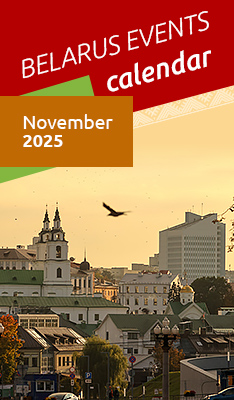




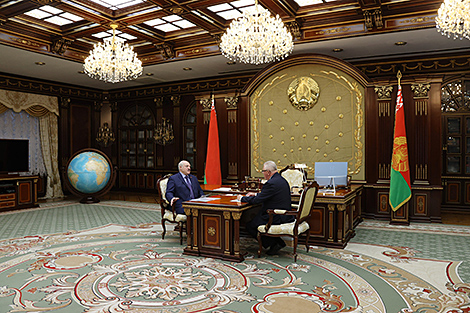
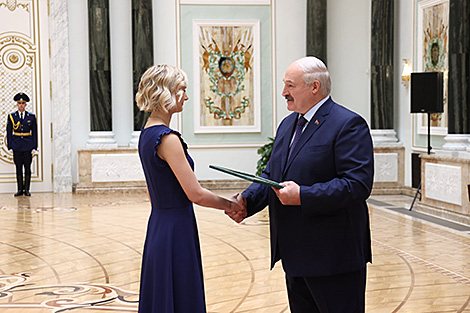
 print version
print version make home page
make home page add to bookmarks
add to bookmarks

